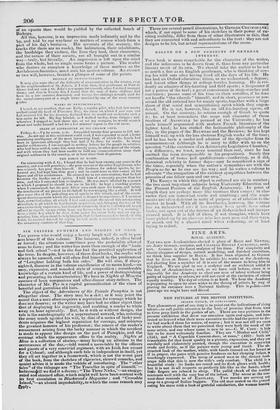ESSAYS ON A FEW SUBJECTS OF GENERAL INTEREST.
THIS book is more remarkable fur the character of the writer. and the inferences to be drawn from it, than from any particular literary merit of its own. We should take the author to be not so much a fine as an English gentleman, who is thinking of sow. ing his wild oats after having lived all the days of his life. He has had an Oxford education; taken, as we understand, a degree; and learnt other things at college besides learning. He is evi- dently an admirer of fox-hunting and field sports; a frequenter if not a patron of the turf; a great connoisseur in stage-coaches and coachmen ; passes some of his time on their outsides, if lie does not handle "the ribands " himself; and in short, possesses or pos- sessed the old national love for manly sports, together with a large share of that social and sympathizing spirit which they engen- dered. lie is not, however, like an old Jex-hunting squire, all animal. On the contrary, he retains enough of Greek to quote it; he at least remembers the scope and character of those treatises of ARISTOTLE he perused at the University ; he has made himself acquainted with modern French literature of the lighter kind; he has studied the fashionable philosophy of the day, in the pages of the BULWERS and the Reviews; he has kept himself well up with the less abstruse English works of the time; and he has been a reader and admirer of the Spectator from its commencement (although he is sorry to differ with us on the question "of the existence of an Aristocratic Legislative Chamber," e-a difference, we trust, more nominal than real, since he has omitted the term irresponsible in his proposition). Surely this combination of tastes and qualifications—conferring, as it did, historical celebrity in former days—may be considered a sign of the times, especially when the author's sympathies are with the People so far as he can see his way ; and he writes a volume to advocate " the recognition of the existent sympathies between the pursuits of our fellow men and our own."
The Essays in which this object is enforced are six in number; the two most important subjects being University Education and the Present Position of the English Aristocracy. In point of length they are perhaps more like treatises than essays : in cha- racter they are somewhat crude and rambling ; and the argu- ments ate often deficient in unity of purpose or of relation to the matter in hand. With all its drawbacks, however, the volume has an unborrew2c1 air : it has neither bJen !wide from other books, nor spun out of the fancies of an ill-furnished and inexpe- rienced mind. It is full of ideas, if not thoughts, which have been picked up by an observer who has seen men and their ways, or struck out by a shrewd mind when reflecting, or at least trying to reflect.


























 Previous page
Previous page